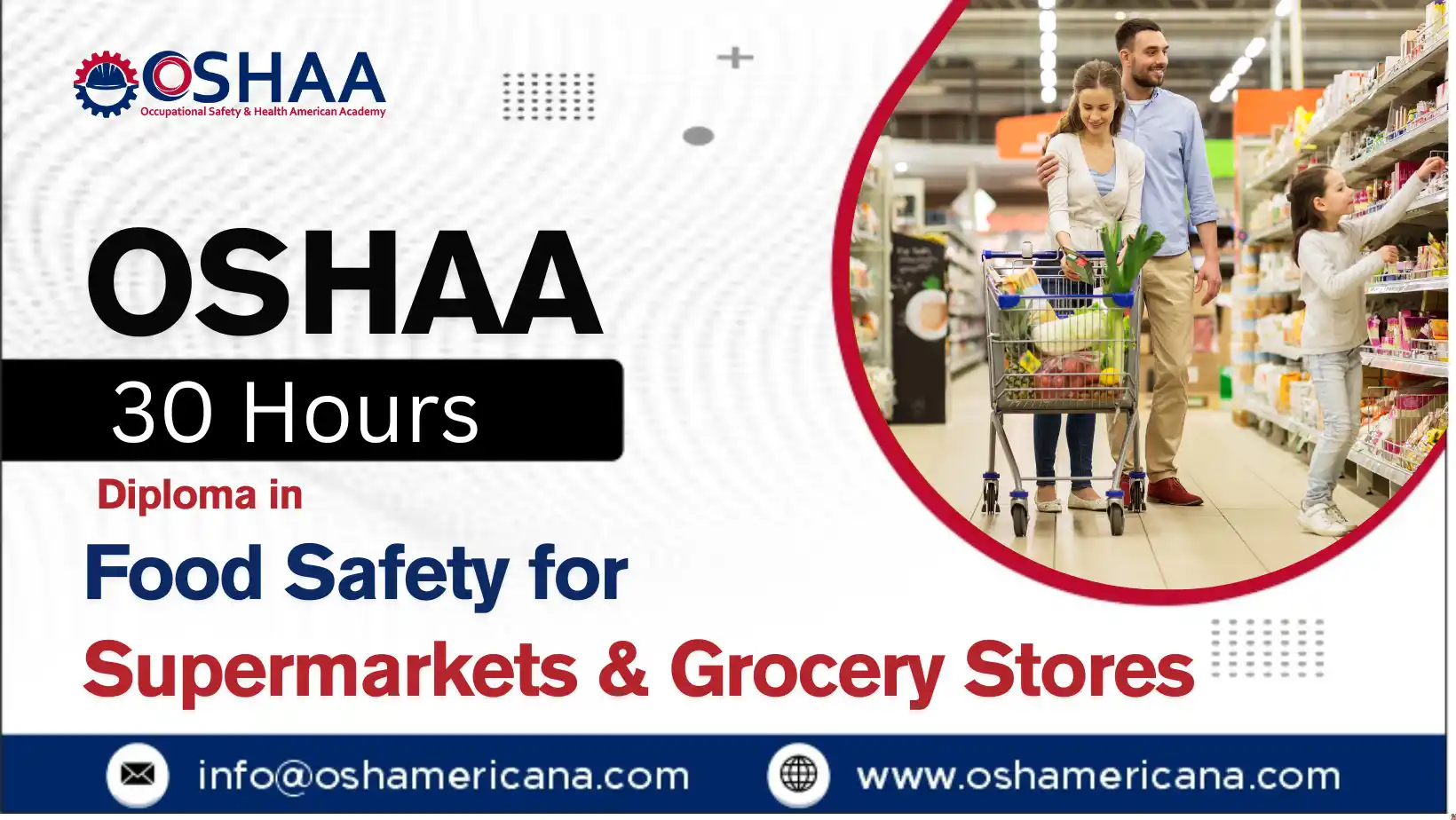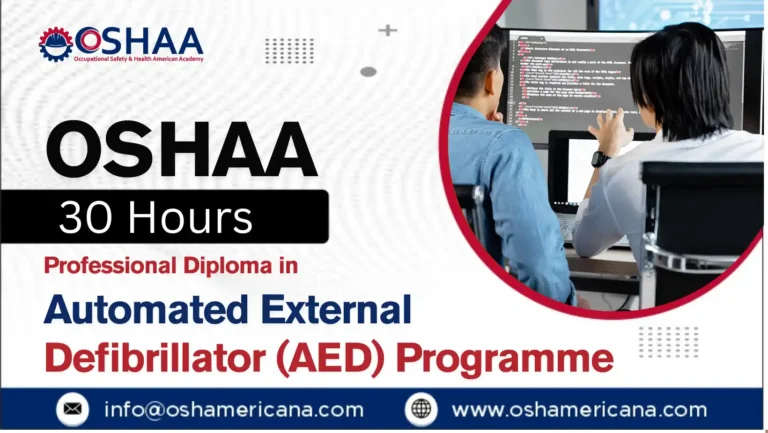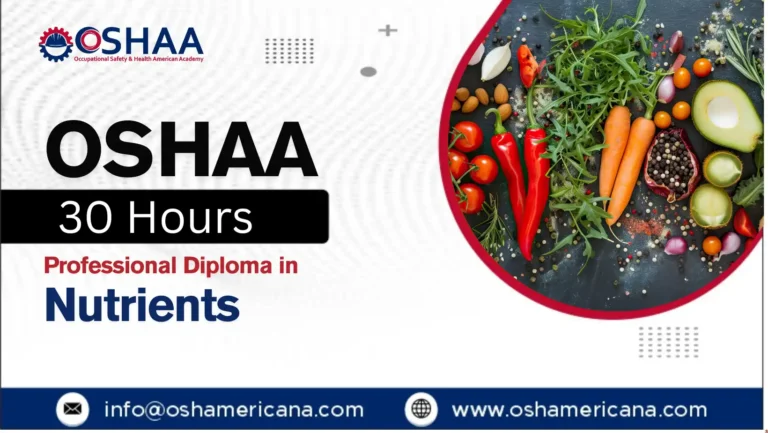Comprehensive Diploma in Food Safety for Supermarkets and Grocery Operations
The OSHAA 30-Hours Diploma in Food Safety for Supermarkets and Grocery Stores is more than just a certificate—it’s a professional commitment to protecting public health and upholding food quality. In a sector where compliance and consumer trust are paramount, this diploma offers the knowledge, skills, and recognition needed to make a lasting impact.
Food safety remains one of the most critical aspects of retail operations, especially within supermarkets and grocery stores. The OSHAA 30-Hours Diploma in Food Safety for Supermarkets and Grocery Stores is a specialised training programme designed to equip retail food handlers, supervisors, and managers with comprehensive knowledge of food hygiene practices, legal compliance, and industry standards.
The OSHAA 30-Hours Diploma is a robust training course tailored specifically for the retail food environment. Unlike generic food safety certifications, this programme addresses the unique challenges supermarkets and grocery outlets face daily. The curriculum aligns with UK and international food safety legislation, making it a recognised credential for both local and global operations.
After completing this diploma, participants may progress to advanced qualifications such as the OSHAA 60-Hours Advanced Diploma in Food Safety or related certifications in HACCP, food auditing, and health and safety management. These advanced pathways enable continued professional growth and eligibility for more senior roles within food retail operations.
OSHAA 30-Hours Diploma in Food Safety for Supermarkets and Grocery Stores
Study Units
Learning Outcomes
Introduction to Food Safety and Hygiene
- Understand the importance of food safety in supermarket and grocery environments
- Learn key terminology related to food hygiene and safety
- Identify common sources of food contamination
- Recognise the impact of poor practices on public health and business reputation
- Develop awareness of hygiene as a critical aspect of retail operations
Foodborne Illnesses and Contamination Risks
- Identify major foodborne pathogens and their health effects
- Understand routes and types of contamination in retail settings
- Distinguish between biological, chemical, and physical hazards
- Apply preventive measures to minimise the risk of foodborne illnesses
- Strengthen knowledge for safe food handling and risk mitigation
Legal Requirements and Food Safety Regulations
- Understand UK and international food safety legislation
- Interpret legal responsibilities of employers and food handlers
- Learn enforcement procedures and roles of regulatory authorities
- Demonstrate compliance with regulatory standards in food retail
- Gain insights into audits, inspections, and accountability
Personal Hygiene and Staff Responsibilities
- Apply best practices for personal hygiene in food handling
- Identify key staff responsibilities in maintaining food safety
- Recognise how poor hygiene can lead to contamination
- Implement procedures for illness reporting and protective clothing
- Promote a culture of safety and responsibility among staff
Safe Food Handling and Preparation Techniques
- Demonstrate safe methods for handling, preparing, and displaying food
- Prevent cross-contamination through effective workflow practices
- Identify risks in food preparation areas and apply controls
- Ensure safe handling of high-risk and ready-to-eat foods
- Enhance skills for consistent quality and safety standards
Temperature Control and Food Storage Practices
- Understand the critical role of temperature control in food safety
- Use thermometers and monitoring tools effectively
- Store food at safe temperatures to prevent spoilage and contamination
- Implement proper rotation and labelling systems (e.g., FIFO)
- Maintain compliance with hygiene and safety standards
Cleaning, Disinfection, and Waste Management
- Differentiate between cleaning and disinfection processes
- Develop and follow effective cleaning schedules and protocols
- Manage food waste and refuse according to hygiene regulations
- Identify and mitigate hygiene risks across store areas
- Promote a safe and sanitary retail environment
Pest Control in Retail Food Environments
- Recognise signs of common food pests and their associated health risks
- Understand preventive measures to minimise pest infestations
- Implement reporting and escalation procedures for pest sightings
- Work effectively with professional pest control services
- Ensure food safety and regulatory compliance in retail settings
This course equips learners with practical skills and regulatory knowledge to maintain high food safety standards in supermarkets and grocery stores. It is ideal for retail staff, managers, and food handlers aiming to protect consumers, prevent contamination, and ensure compliance with food hygiene regulations.
- Enhances knowledge of essential food safety principles tailored specifically to supermarket and grocery store operations
- Equips staff with practical skills to identify, manage, and prevent food safety risks in retail environments
- Supports compliance with UK and international food safety legislation, reducing the risk of legal penalties
- Promotes a culture of hygiene, accountability, and safety among team members
- Reduces the likelihood of foodborne illnesses and product recalls through improved handling and storage practices
- Improves customer trust and brand reputation by maintaining high safety and hygiene standards
- Increases staff confidence in dealing with inspections, audits, and food safety emergencies
- Contributes to overall operational efficiency by standardising food safety protocols across departments
- Offers a valuable qualification for career development within the food retail sector
- Helps organisations meet training requirements for food safety accreditation and certification bodies
This course is designed for professionals working in or aspiring to work within food retail environments, particularly in supermarkets and grocery stores. It is suitable for:
- Supervisors and team leaders responsible for food departments such as produce, meat, dairy, bakery, and deli counters
- Store managers overseeing food safety compliance and operational standards
- Food handlers involved in the preparation, packaging, display, or sale of food items
- Quality assurance personnel and internal auditors within retail food operations
- Staff involved in stock management, cold storage, and chilled or frozen food logistics
- New employees seeking foundational knowledge in food safety practices
- Business owners and franchise operators looking to ensure regulatory compliance and staff competency
- Individuals aiming to enhance their qualifications for career advancement in the food retail sector
No prior food safety certification is required, making this course accessible to both experienced professionals and those entering the industry.







